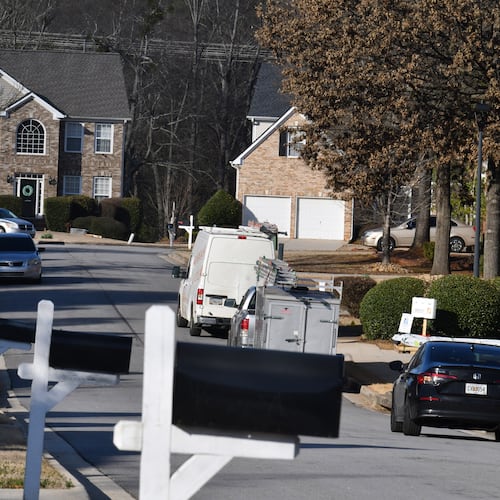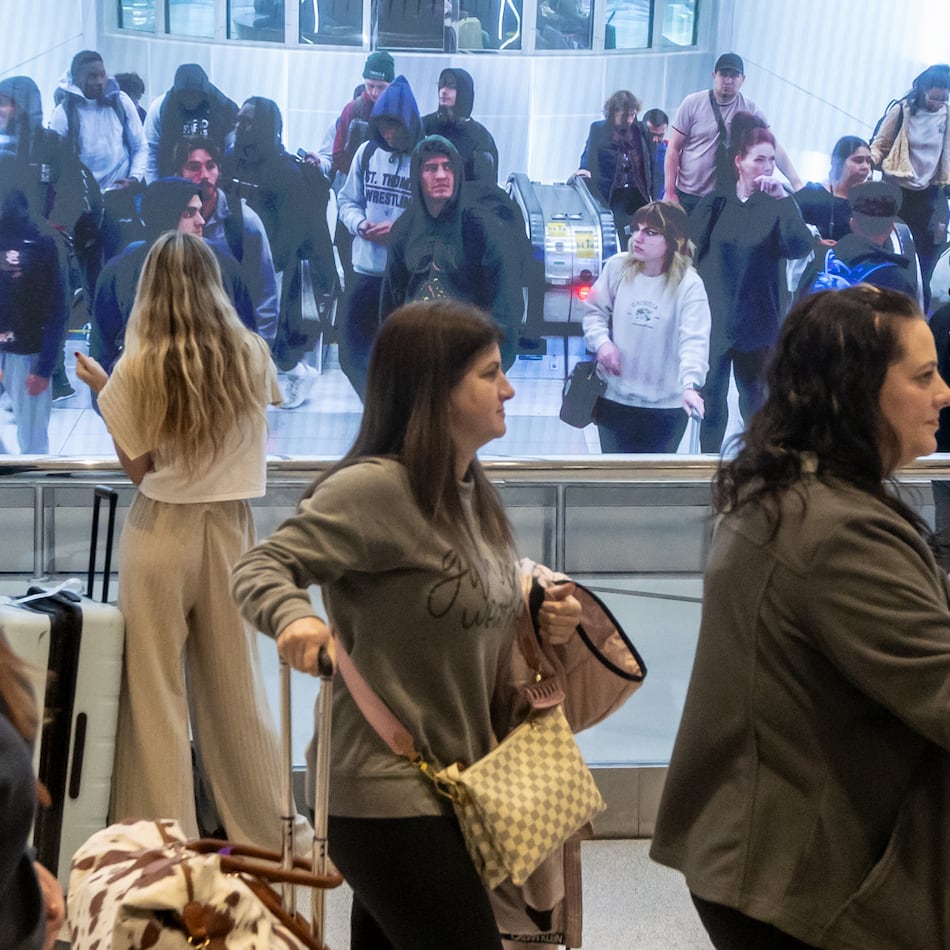For five years, Kyle Booth has enjoyed his woodsy Ormewood Park neighborhood and the buzz of a community on the upswing. Across the street from his house, a bungalow for sale beckons potential buyers with a flier: “Sip a glass of wine after a long day on your deck in the private backyard.”
But nowadays when he’s in his yard, Booth finds himself surveying the landscape suspiciously, always looking over his shoulder. “The most scared I’ve been here,” he confides, “has been the last two weeks.”
“Lately, I’m driving my daughter to school, when she used to walk.”
Two weeks ago, a neighbor a couple of doors down was accosted by three armed men as he returned from shopping with his wife and young daughter about 8 p.m. The night before, police believe, the same men killed a man during a 10 p.m. robbery in Virginia-Highland. Last weekend, a man gardening in his backyard in southeast Atlanta shortly before noon was marched at gunpoint back into his home, where he, his wife and 9-year-old daughter were forced to the floor and robbed.
The random, violent and brazen nature of the crimes — and the surrounding publicity — has put Atlantans on guard, contributing to a spike in the number of people joining crime watches and organizing neighborhood meetings. Some are demanding more police action, although authorities say they have stepped up their efforts and that crime is actually down citywide. Others warn that residents are more and more willing to defend their neighborhoods with weapons.
The attacks have spurred a growing public outrage like last year, when John Henderson, a popular bartender at a restaurant near Grant Park, was shot to death in a robbery, allegedly by a gang member. The killing and other audacious crimes caused angry residents to organize and make public safety the key issue of the 2009 Atlanta mayoral campaign. City officials continually pointed out that statistics indicated that crime was dropping. That didn’t matter. People just didn’t feel safe.
“There are home burglaries and car break-ins here, but nothing hits you like these,” said Booth of the recent attacks. “It changes the way you feel about a place.”
Residents began to take notice on Nov. 22, when three men approached Charles Boyer and his girlfriend as they got out of a car in the Virginia-Highland neighborhood. They robbed the couple and then ordered the two to walk toward her apartment. The pair, sensing the worst, started running, but Boyer was shot to death.
Boyer, like Henderson, put a face on an issue that already was percolating in the community, said Kyle Keyser, an armed robbery victim who founded Atlantans Together Against Crime after Henderson’s slaying.
“Certain events create a tipping point where people get angry and speak out. John Henderson was absolutely a tipping point,” he said. “That cycle has started again.”
Almost a year into Reed’s first term, crime is down 10 percent, said Police Chief George Turner, the well-liked career Atlanta cop picked by the new mayor to head a demoralized and undermanned force.
Turner has spent 11 months attending civic meetings, business breakfasts and neighborhood coffee klatches to rebuild a rapport with the public. Turner said the recent attacks are alarming because “the egregiousness of the crimes. It’s the stranger-on-stranger nature.”
The department’s weekly statistics report backs up the chief on the crime drop: As of Nov. 27, there have been double-digit drops this year in rape, robbery, burglary, larceny from vehicles and car thefts. Although shooting incidents are down 9 percent, murders are up 23 percent this year, with 85 as of Nov. 27. Despite the increase, police spokesman Carlos Campos said, since 1964, there have been only two years with fewer than 100 homicides: last year, with 80, and 2005, with 89.
“But I don’t want to talk about numbers because they mean so little,” Turner said. “When I go to a meeting, folks don’t want to hear about that.”
He said the force has nearly 1,800 officers, almost 100 more than a year ago. He’s proposing adding 12 new beats to the existing 66 and is forming a community policing unit to build relations with residents. “We simply cannot fight crime by ourselves,” he said.
John Wolfinger, the public safety chairman of the Virginia-Highland Civic Association, said he has heard from four or five people who want to be neighborhood watch block captains because of the recent killing. He said residents had gotten comfortable, but that ended with a rash of armed robberies in late summer and early fall.
The Boyer killing hit home, he said, because “these people were quite obviously doing nothing out of the ordinary. It was the sort of thing that could happen to you or me.”
Nosy neighbors, coupled with social media and more police patrols, have apparently made a difference in Zone 6, which this year saw a 35 percent drop in residential burglaries through October, the city’s largest drop. Zone 6 includes Virginia-Highland, Inman Park, Candler Park and areas that have gentrified in the past decade, such as East Atlanta and Ormewood Park.
Burglary figures in Beat 610, which is East Atlanta, are down more than 50 percent since last year, when the area was plagued by smash-and-grabs.
It’s an area where many of the residents are active, technologically proficient and know how to work the system to pressure police to beef up patrols.
“Some areas are noisier than other areas,” Turner conceded. “But any crime affects me.”
Just hours after an interview Thursday, Turner was getting ready to meet with residents in the English Avenue area, a crime-plagued spot west of downtown.
Linda Adams, head of the public safety committee for the Vine City and English Avenue communities, said, “The hard problem is getting the neighborhood to participate in any meeting or neighborhood watch.”
Many crimes go unreported, she said. “It all depends on where it occurs and who makes it known. It’s the squeaky wheel.”
Adams said she and others have long tried to make the area more active in reporting crimes and working in tandem with police. Two neighborhood watch training programs in Vine City and English Avenue took place last month, she said, with another set for Dec. 15.
Ultimately, a city must draw in businesses and tax-paying residents to thrive — people like Hannibal Heredia, a lawyer who has lived in Atlanta for 17 years. Since 2006, he and his family have lived in a cluster of new, high-end Craftsman-style homes in an area in southeast Atlanta known as Benteen Park.
Some of the homes have been victimized by property crimes. But that’s part of the cost of living in the city, he said. “If you’re a thief, you’re going to go where, if you break the door down, you’ll get something,” he said.
But an attack on Heredia and his family last weekend has him rethinking his in-town lifestyle. Last Saturday morning, Heredia was gardening when a car squealed to a stop in the alley behind him and two men jumped out. One stuck a gun in his face and ordered him back into the home.
Once inside, he, his wife and 9-year-old daughter were ordered to lie face down on the floor while the men shouted threats. The intruders took their wedding rings, flat-screen TVs and other valuables and were loading them into the family Audi when the Heredias made a break to a neighbor’s home. The attackers sped off, leaving behind a vehicle they had carjacked.
The incident has left the family shaken and wondering about what’s gone wrong in society.
“Do I feel safer when they say crime is down?” Heredia shrugged. The strategy of the crime was all wrong, he reasoned. If they wanted flat-screen TVs and valuables, then why didn’t they just wait until Monday when no one was home? Then there would be no witnesses, no drama, he said.
“My concern is are we getting gangs where things like this are sport?” Heredia asked. “The concern is what’s the psychology of people who will do something like this.”
The Heredias have moved back into their home. But they don’t know for how long.
“I love the city; we still love these neighborhoods,” he said. “Do I want to stay here? I don’t know. A lot of the charm is starting to disappear.”
About the Author
The Latest
Featured


